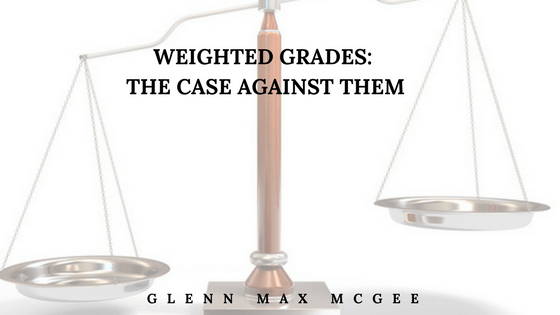Countless high school students perseverate excessively about their Grade Point Average (GPA). There is no doubt that GPA is one of the most important factors that colleges will consider in admissions and scholarship applications and obsession with GPA has led to excessive, unhealthy levels of stress in hundreds, if not thousands, of high schools. However, GPA can vary drastically in the way it’s calculated at different high schools. Some high schools use unweighted GPAs, some use simple one point weighted GPAs, and others use complex weighting formulas. We do not see weighted grades in middle schools, colleges, or grad school, so why are they such a big deal in high school?
What are Weighted grades?
Weighting a grade means adding an extra point, fraction of a point, or even points to the student’s course grade based on the difficulty of the course. Most schools have a four point system: an A is worth 4 points, a B 3 points, a C 2 points, and a D 1 point and will add that extra point, fraction, or more to harder classes. For example, in Palo Alto, sophomores, juniors, and seniors all receive an extra point for a C or better in any class designated as an honors or Advanced Placement (AP) class. In New Trier High School in Illinois, that same student could take an AP or “high honors’ class and receive and receive an extra 1.33 points for their grade. Meanwhile, at the Illinois Mathematics and Science Academy (IMSA), there is no weighting at all. Thus, a student getting a “B” in AP Calculus will have a 3.0 on his report card at IMSA, a 4.0 in Palo Alto and a 4.33 in New Trier. As you can see, weighted grades cause extreme variations across different school districts and states, leading to unfair comparisons when it comes time to be considered for the same college. As a result, most colleges use their own systems to calculate grades to assure a level playing field. Yet high schools persist.
Reasons For Weighted GPAS
Approximately 75% of high schools report weighted GPAs. Why are the majority of our high schools choosing weighted grades? When I researched practices across the country, talked to students and parents and conducted town halls, forums, surveys, and webinars, the primary reasons given by the majority of both students and parents, I learned they favor grade weighting because they perceive it gives students a competitive advantage in being admitted to their “dream schools,” in receiving scholarships, and in providing a “safety net’ for taking more challenging classes. Also, parents and students frequently mentioned that students taking harder classes deserved an extra point because they worked harder, should be rewarded for challenging themselves, and even entitled to an extra point for extra effort.
Reasons Against Weighted GPAS
Given that most colleges recalculate grades for admissions and scholarships, there really is no competitive advantage for grade weighting. Also, while I appreciate students’ desire for a safety net or reward, we all know that intrinsic motivation, i.e. taking a class for the sake, joy, and purpose of learning, is both more meaningful and lasting as extrinsic motivation, i.e. taking a class for an extra grade point. Moreover, there are even more reasons supporting the fact that weighted GPAs are detrimental to students. Weighted grading creates undue and unhealthy stress, reduces enrollment in unweighted elective classes, and exacerbates existing inequities in our school systems.
Stress
Reporting weighted grades on transcripts creates a highly competitive, attainment-oriented culture that is highly stressful and unhealthy for many, if not most, students. Students who overload themselves with AP and Honors classes will generally have more homework and consequently less time to sleep, relax or play. Our students are already suffering from sleep deprivation, as I discussed in a previous post, and a weighted GPA system does nothing but drive students to pad their schedule with a higher workload impart more stress, disrupting their sleep further. Excessive stress eventually leads to higher anxiety and even depression which in turn lead to disengagement, truancy, and even self-harm.
Electives Disappear
Another way in which weighted grades can hurt, not help, our students is through the disappearance of elective classes. Students striving to maximize their WGPA will focus on packing their schedules with Honors and AP classes and not pursue unweighted electives that may interest them and allow them to express their creativity. In order to keep up with their fellow peers and achieve the highest GPA possible, students will change course taking habits to take more APs and Honors courses while they take fewer of the interesting, robust electives not designated for weighting as such Journalism, Shakespeare, Philosophy, or courses in the Fine Arts. In fact, students that take numerous weighted classes will likely have GPAs well over 4.0 such as a 4.2, 4.33, 4.4567, etc.. If these students take an unweighted elective and get an A (4 points), their GPA actually DROPS. It is no wonder unweighted elective classes become less popular in weighted systems.
Inequity
A weighted GPA system has another downfall, this one with harsh ramifications. While recent initiatives have made Advanced Placement classes more accessible for all students, enrollment of historically underrepresented students in more rigorous classes is still nowhere near proportional. There are still barriers to full opportunity and access, the primary one being the early educational background of the students. In districts where there is a significant achievement gap, most low-income students will not have the preparation and foundational skills to succeed in multiple AP classes. With a weighted grading system, more affluent classmates who already have educational advantages and more opportunity and access to high quality programs and experiences – both within and outside of school – in elementary and middle school now have an additional advantage of an extra point as they have been better equipped to take multiple AP and honors courses.
While one could make a case that weighted grading will benefit students applying for admissions and scholarships to those very, very few schools that do not recalculate grades, a far more compelling case can be made for eliminating this extensive practice. One of my former students said it best in her op-ed column to the local paper:
“Instead of weighting GPAs, can we encourage inquiry-driven learning for the sake of learning? Can we harness the freedom that blended courses offer to grow beyond the constrictions of the AP and provide classes that are based on discussion, exploration and analytical debate? Can we celebrate passions without accolades? Can we require free time, adequate hours of sleep, time spent with friends, or reading books for pleasure? High school shouldn’t be about manufacturing GPAs. This is our time to explore, take risks and develop skills we didn’t know we had. We must feel free to choose courses that support the self-discovery and personal growth needed to carry us past bachelors and masters and doctorates to what matters most: the way our educations are put to use and how we shape our lives –– the friends and partners we choose, the families we create, the companies we start, the books we write, the films we make, the people we heal, the technologies we invent and the lessons we pass down to our children.”

